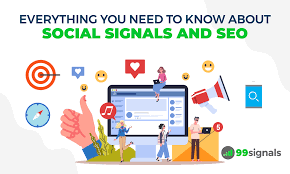The Impact of Social Signals on SEO
Social signals refer to the metrics related to a website’s social media activity, such as likes, shares, comments, and overall engagement. These signals play a crucial role in search engine optimization (SEO) and can significantly impact a website’s ranking in search engine results pages (SERPs).
Search engines like Google consider social signals as indicators of a website’s credibility, relevance, and authority. When a piece of content receives high engagement on social media platforms, it sends a signal to search engines that the content is valuable and worth ranking higher in search results.
Here are some ways in which social signals can influence SEO:
- Increased Visibility: Content that receives a high number of social shares is more likely to reach a larger audience, leading to increased visibility and traffic to the website.
- Improved Brand Awareness: Active engagement on social media helps build brand awareness and loyalty, which can indirectly impact SEO by generating more branded searches and backlinks.
- Enhanced Link Building: Social signals can contribute to natural link building as engaging content is more likely to attract backlinks from other websites, which are essential for SEO.
- Faster Indexing: Search engines often crawl popular social media platforms frequently. When content is shared and engaged with on these platforms, it can lead to faster indexing of the associated web pages.
Incorporating social signals into your SEO strategy can help improve your website’s overall performance in organic search results. By creating high-quality content that resonates with your target audience and encourages social sharing, you can leverage the power of social signals to boost your SEO efforts.
Remember that while social signals are important for SEO, they should complement other optimization strategies such as keyword research, on-page optimization, and link building. A holistic approach that integrates various elements of digital marketing is key to achieving long-term success in improving your website’s visibility and ranking on search engines.
If you want to enhance your website’s SEO performance through social signals, start by developing a robust social media strategy that focuses on creating engaging content and fostering meaningful interactions with your audience across different platforms.
Understanding Social Signals in SEO: FAQs and Strategies for Success
- What are social signals in SEO?
- How do social signals impact SEO?
- Which social media platforms have the most influence on SEO through social signals?
- Can buying social signals improve SEO performance?
- What strategies can be used to increase social signals for better SEO?
- Are social signals a direct ranking factor in search engine algorithms?
What are social signals in SEO?
Social signals in SEO refer to the metrics and interactions generated on social media platforms that indicate a website’s popularity, relevance, and authority to search engines. These signals include likes, shares, comments, retweets, and overall engagement with content shared on social media. Search engines like Google consider social signals as a way to gauge the quality and value of a website’s content based on how users interact with it on social platforms. Incorporating social signals into an SEO strategy can help improve a website’s visibility and ranking in search engine results pages by signaling to search engines that the content is valuable and worth promoting.
How do social signals impact SEO?
Social signals have a significant impact on SEO by influencing a website’s credibility, relevance, and authority in the eyes of search engines. When content receives high levels of engagement on social media platforms, such as likes, shares, and comments, it sends a signal to search engines that the content is valuable and deserving of higher rankings in search results. Social signals can enhance a website’s visibility, improve brand awareness, facilitate link building, and expedite the indexing of web pages. By incorporating social signals into an SEO strategy through creating engaging content and fostering interactions on social media, website owners can leverage these signals to boost their overall SEO performance.
Which social media platforms have the most influence on SEO through social signals?
When it comes to the influence of social signals on SEO, certain social media platforms stand out for their impact on search engine rankings. Platforms like Facebook, Twitter, LinkedIn, and Pinterest are known to have a significant influence on SEO through social signals. These platforms provide opportunities for content to be shared, liked, and engaged with, signaling to search engines that the content is valuable and relevant. Leveraging the reach and engagement potential of these popular social media platforms can help boost a website’s visibility and authority in search engine results pages.
Can buying social signals improve SEO performance?
The question of whether buying social signals can improve SEO performance is a common one in the realm of search engine optimization. While purchasing social signals may initially boost the visibility and engagement metrics of a website, it is important to note that search engines like Google prioritize organic and authentic signals over artificially generated ones. Buying social signals can potentially lead to short-term gains but may not have a significant long-term impact on SEO performance. It is crucial for website owners and marketers to focus on creating high-quality, engaging content that naturally attracts social shares and interactions to build a strong foundation for sustainable SEO success.
What strategies can be used to increase social signals for better SEO?
To increase social signals for better SEO, several strategies can be implemented. Firstly, creating high-quality and engaging content that resonates with the target audience is crucial. This content should be shareable and encourage users to interact with it on various social media platforms. Additionally, actively engaging with followers by responding to comments, initiating discussions, and sharing relevant industry news can help boost social signals. Collaborating with influencers or partnering with other brands for cross-promotion can also amplify social reach and engagement. Implementing social sharing buttons on your website and incorporating visual elements like images and videos can further enhance the likelihood of content being shared across social networks. Consistency in posting regular updates and monitoring analytics to understand what type of content performs best can also contribute to increasing social signals for improved SEO performance.
Are social signals a direct ranking factor in search engine algorithms?
The question of whether social signals directly influence search engine rankings is a common topic of discussion in the realm of SEO. While there is ongoing debate among experts, search engines like Google have not explicitly confirmed that social signals are a direct ranking factor in their algorithms. However, many SEO professionals believe that strong social signals can indirectly impact rankings by signaling to search engines the popularity and relevance of content. Ultimately, while the exact relationship between social signals and SEO remains somewhat ambiguous, maintaining an active presence on social media and fostering engagement can still benefit a website’s overall visibility and organic performance in search results.


